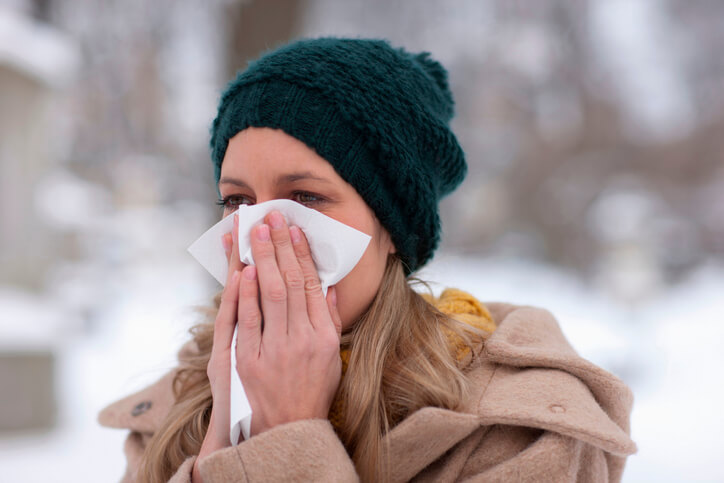What Is HMPV?
.jpg?rev=096cbad2109d498cacaba1f378a4dbd7)
This content was reviewed and approved by Jacqueline Gisch RN, MSN
Human metapneumovirus (HMPV) is a common respiratory virus that typically causes symptoms similar to the common cold. However, it can cause more severe illness in some people, including young children, people with weakened immune systems, and adults over age 65.
This article provides information on HMPV, including its symptoms, how it’s transmitted, risk factors for developing severe illness, and more.
HMPV Causes, Transmission and Symptoms
HMPV is caused by a virus in a group that includes RSV, measles, and mumps. People contract the illness from airborne particles when someone coughs or sneezes, by hugging, kissing, or shaking hands with an infected person, or by touching contaminated surfaces.
HMPV symptoms include:
- Stuffy or runny nose
- Sore throat
- Cough
- Wheezing
- Shortness of breath
- Fever
- Rash
Most people get HMPV before age 5 and experience mild symptoms that last a few days to a week. If the virus affects the lower respiratory tract, severe illness can occur and last longer. Severe illness typically happens between 6 and 12 months of age.
HMPV complications can include:
- Bronchitis
- Asthma or COPD flare-ups
- Pneumonia
- Bronchiolitis
- Ear infections
You can contract HMPV again, but subsequent infections typically have milder symptoms.
HMPV Diagnosis and Treatment
Most cases of HMPV resolve on their own. However, if you experience severe symptoms, your doctor might test you for HMPV and other viruses. They use a soft-tipped swab to collect material from your nose or throat and send it to a lab for analysis. In some cases, they might also order bronchoscopy or chest X-rays to look for problems in your lungs.
There aren’t any antiviral medicines for treating HMPV. If you contract the illness, your doctor will typically advise you to stay home and manage your symptoms.
If you develop a severe illness, you might have to be admitted to the hospital for monitoring and treatment with oxygen therapy (to provide extra oxygen), corticosteroids (to reduce lung inflammation), or intravenous fluids (to keep you hydrated).
How To Avoid Getting Sick or Spreading HMPV
Tips to avoid getting HMPV or infecting others are similar to those for other respiratory viruses and include:
- Washing your hands frequently with soap and water or using an alcohol-based hand sanitizer.
- Coughing or sneezing into the bend of your elbow (rather than your hands) and encouraging others to do the same.
- Avoiding people who are sick and isolating if you’re ill.
- Wearing a mask if you have to be around sick people or are ill.
- Avoiding touching your face, eyes, nose, and mouth.
- Not sharing foods, beverages, or utensils with others.
When To Seek Medical Help for Yourself or a Loved One
You should contact your doctor if you or a loved one has HMPV symptoms and an underlying health condition that elevates the risk of severe illness. You should also seek medical attention if HMPV symptoms don’t improve in a few days or a child has a fever lasting more than three days.
You should go to an emergency room if you or a loved one experiences any of the following symptoms:
- Trouble breathing.
- Fever over 103 degrees Fahrenheit.
- Bluish color of the lips, nail beds, or skin.
- Adverse effects on other health conditions.
Talk With Your Baptist Health Doctor About HMPV
If you suspect you or a loved one has HMPV and have questions or are concerned about the risk of developing severe illness, contact your Baptist Health provider. They can advise you on any steps you should take.
If you don't have a Baptist Health provider, you can find one with our online provider directory.
Next Steps and Helpful Resources
Learn More about Infectious Disease Care at Baptist Health.
What Is RSV?
What Is the Bird Flu?
What Are Measles?
How Is Bird Flu Transmitted to Humans?



.jpg?rev=9ddf6790805749b994e44780efdfb13c)